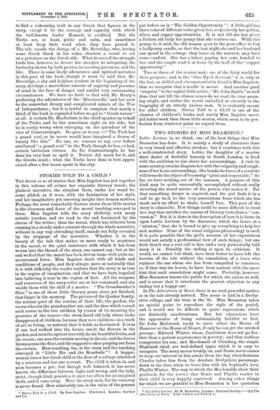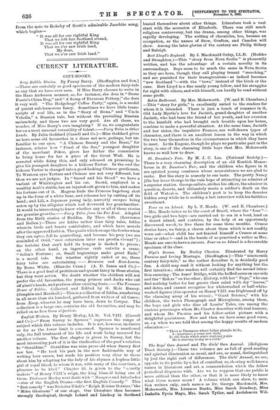TWO STORIES BY MISS BRAMSTON.* Lottie Levison is, we think,
one of the best things that Miss Bramston has done. It is mainly a study of character done in very broad and effective strokes ; but it combines with this a well-constructed story. Lottie, the daughter of a marine store dealer of doubtful honesty in South London, is fired with the ambition to rise above her surroundings. A visit to some country cousins disgusts her with the vulgarity and rough- ness of her home surroundings. She bends the force of a resolute will towards the object of becoming "quiet and respectable." So far, we have nothing out of the common. A purpose of this kind may be quite successfully accomplished without really elevating the moral nature of the person who makes it. For that something deeper is required, and the girl finds it in a call to go bask to the very associations from which she has made such an effort to shake herself free. This part of the story is admirable. Few things could be more difficult to treat in a way that satisfies the canons of literary taste than a " con- version." But it is done in the description of how it is borne in upon Lottie Levison by the discourse, which she hears at a "mission," that she is bound to give up everything to help her sick mother. None of the usual religions phraseology is used.
It is quite possible that the girl's account of her experiences would not satisfy a professional view of such things ; but one feels that it was a real call to her, and a very pathetically told story it is. Possibly the ending is open to criticism. It would, we cannot bat think, have been better to have left the heroine of the tale without the consolation of a lover who replaces the one whom she has been compelled to renounce, or, if that was too heroic, to have been content with the mere hint that such consolation might come. Probably, however, Miss Bramston knows the public for which she caters so well, and is aware that it entertains the gravest objection to any ending but a happy one.
In The Adventures of Denis there is no such powerful motive as in the tale already noticed. The scene is laid in a Derby- shire village, and the time is the '45. Miss Bramston takes no special pains to reproduce the style of the period, and it would not be difficult to quote expressions which are distinctly anachronisms. But her characters have the appearance of being substantially faithful to fact. Sir John Maltwood, ready to serve either the House of Hanover or the House of Stuart, if only he can get the coveted peerage ; Edward Winter, whose Jacobitism does not go fur- ther than a patient acquiescence in poverty ; and that restless conspirator his son ; and Macdonald of Glendarg, the simple Highland chief, are well-defined types which it is easy to recognise. The story moves briskly on, and Denis never ceases to keep our interest in him awake from the day when footman Charles takes him from the desolate Derbyshire parsonage, down to the time when we leave him with his boyhood's love, Phyllis Winter. The way in which the Macdonalds show their gratitude for the service that Denis and Phyllis render to their chief is very happily contrived. Among other things for which we are grateful to Miss Bramston is her quotation
• (1.1 Lottie Levison. By M. Bramston. London: National Society.—(2.) The Adventures of Denis. Same Author and Publishr.r.
from the note to Rokeby of Scott's admirable Jacobite song, which begins- " It was all for our rightful King That we left fair Scotland strand, It was all for our rightful King That we e'er saw Irish land, My dear, That we e'er saw Irish land."























































 Previous page
Previous page